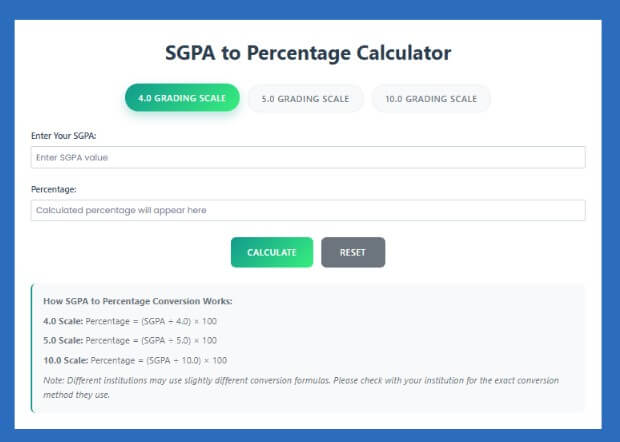SGPA To Percentage Calculator
You can easily convert your SGPA to a percentage. Knowledge of both SGPA and percentage is very important. Then you will be able to compare both.

SGPA to Percentage Calculator
How SGPA to Percentage Conversion Works:
4.0 Scale: Percentage = (SGPA ÷ 4.0) × 100
5.0 Scale: Percentage = (SGPA ÷ 5.0) × 100
10.0 Scale: Percentage = (SGPA ÷ 10.0) × 100
Note: Different institutions may use slightly different conversion formulas. Please check with your institution for the exact conversion method they use.
Grade Calculator
What’s an SGPA to Percentage Calculator?
If you’ve got your SGPA but need the percentage, this tool makes it simple. No formulas, no confusion . Just enter your SGPA and get the percentage right away.
Why use it?
- It’s quick and saves time
- No need to calculate anything manually
- Helpful for college applications, resumes, or just personal records
Let us see how you did overall in one go
SGPA (Semester Grade Point Average) is how colleges measure your progress each term. But most forms and applications still ask for percentages and that’s where this calculator helps. SGPA & CGPA both are important terms. It takes your SGPA and translates it into something everyone understands.
Understanding SGPA and Percentage

SGPA means Semester Grade Point Average. It's a number that shows how you did in one semester. It’s based on your subject grades and the number of credit hours each one has. The result is usually on a scale from 0 to 10.
Now, CGPA is different. That one adds up all your SGPA from different semesters. So while SGPA is for one term, CGPA tells your full academic progress.
On the other side, a percentage is just what most people are familiar with, marks out of 100. It’s what job forms and university applications usually ask for. Because of that, students often need to convert their SGPA into a percentage.
How to Convert SGPA to Percentage Online?
There’s a common formula that many colleges use:
(SGPA × 10) – 7.5 = Percentage
Let’s do an example. Consider SGPA is 8.0:
- 10 multiplied by 8.0 => 80
- After subtracting 7.5 => 72.5%
- Hence, the final percentage would be 72.5%.
But keep in mind, some colleges might use a different method. It depends on their grading rules. So always double-check with your college before assuming the result.
What Do Different Indian Colleges Use?
Not every university follows the same formula. Here are some examples:
- Pune University (SPPU): They multiply CGPA by 8.8.
- AKTU: They calculate SGPA by taking each subject’s grade and multiplying it by credit hours.
- VTU: This one uses a credit system, too. The grades and subject weights both matter.
- JNTUH: Uses a 10-point system and follows UGC rules to get the percentage.
- Mumbai University: It depends. Sometimes they use a 7-point scale. If it's 10-point, then percentage = (CGPA × 7.1) + 11
Why It Matters
A lot of applications, whether for jobs or higher education, ask for your percentage, not SGPA. So knowing how to convert it is useful. Even though SGPA gives a good idea of how you’re doing, the percentage is more widely accepted and easier to compare.
How to Boost SGPA (The Real Way)?
Not going to lie, improving your SGPA is tough. But not impossible. Here's what works for most students.
1. Know What You Want
Seriously, just sit down and think, what’s the goal this semester? Want a 3.5 GPA? Then plan for it.
2. Don’t Overdo the Planning
You don’t need some crazy color-coded timetable. Just make sure you’re not ignoring subjects. A basic routine is enough.
3. Ask for Help – Early
If you don’t get something, don’t wait. Ask your teacher, message a friend, search it on YouTube. Fix it right away.
4. Stay Awake in Class
Half your work is done if you just stay alert during lectures. You won’t have to relearn it later.
5. Avoid Last-Minute Studying
Cramming is a mess. Read your notes every few days, even if it’s just 10 minutes. That stuff sticks.
6. Use Free Resources
Google, YouTube, PDFs from seniors, free stuff is everywhere. Use it.
7. Sleep, Eat, Chill
Sounds weird, but if you’re not sleeping or eating right, your brain won’t work. Take care of that.
8. See What Went Wrong Before
Check your past papers or grades. Where did you lose marks? Were they silly mistakes or weak subjects?
9. Try Other Study Tricks
Some people need visuals. Some talk out loud. Others just read quietly. Find your style.
10. Don't get distracted
Bad week? Fell off routine? No problem. Get back on. Never get disappointed after something bad happens; keep on trying.
Summary
You can't be a perfectionist. Just be better than before. Even small steps matter. Try to improve yourself. Maintain Discipline in every aspect of your life so that you can succeed. If you are interested in percentile ,then you can also check it out. You can use the above-mentioned techniques to achieve a better lifestyle and a good future. Then, you can achieve your desired grades, CGPA, and percentage.
FAQs